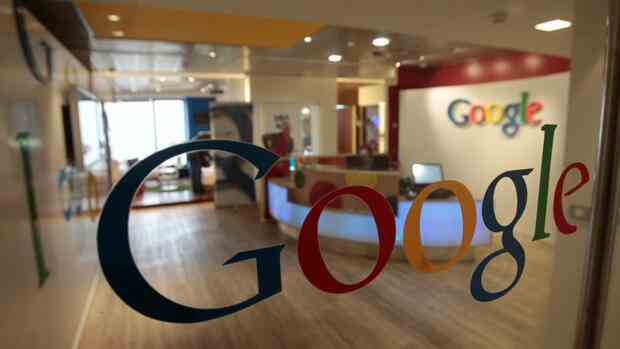The US group likes to invite start-ups to work together – it doesn’t always end well for the young companies.
(Photo: Reuters)
Once again, an unfortunate founding duo believed they could build a big company with the help of Google. Once again, the US company has changed its mind. The case of Barely Digital, a start-up from Bavaria, shows why a deal with Google often turns out to be a pact with the devil.
Google keeps promising to make small businesses big. Again and again it makes them dependent on its advertising – and drops them as soon as it is better for profit or the company’s image.
The case of Barely Digital has gone like this so far: The start-up has been selling vignettes online since 2018. This is not highly innovative, but practical. If you want to drive to the Czech Republic, for example, you can find all the information about the toll in German from the company. If you have to continue through Slovakia to Hungary, you can buy and save the vignettes in the same app. In order to be found by drivers, the company advertised on Google.
It went so well that Google itself became aware of the company in 2021. The founders were invited to a kind of coaching. The goal: 100 percent growth in the high season. What did the founders also learn there? Of course: to rely even more on Google.
Sales experts helped make the ads even better. The founders sunk their money into the search engine like a slot machine. Four million euros in twelve months.
Google as the top consumer advocate – that would be a really good joke
You have to give the group credit for the fact that it worked: But now it’s suddenly over. Suddenly it occurred to Google that vignette advertising is not allowed. For the past two years, a Google policy has banned ads for everything that can be bought directly from government agencies or providers commissioned by the state.
The company keeps promising to make small companies big.
(Photo: Bloomberg)
Even if a court has now found Google right: However, Google’s argument that the founders should have known it themselves is cheeky. Not just because apparently even their own people didn’t know. But above all because this behavior does not fit at all with Google’s marketing message of being the friend and helper of the start-ups.
Barely Digital can hardly be found in Google searches anymore without ads. It lost 80 percent of its sales and 20 percent of its employees had to leave.
The founders cannot believe that Google suddenly finds their service fee for vignettes reprehensible. Google as the top consumer advocate – that would be a really good joke.
You can only make sense of it. Perhaps Google itself wants to offer vignettes in its apps for cars. That’s a blatant accusation. But price comparators, holiday home brokers and job portals have experienced similar things with Google. And the moral of the story: it’s not worth relying on Google.
More: Bouncer Google: German travel start-up is fighting the tech group in court.
